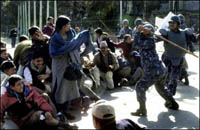Student’s opposition strike in Nepal
Police fired tear gas and fought frenzied street battles with protesters Friday on the second day of a strike called by government adversaries of King Gyanendra, who faces mounting opposition since he seized power a year ago. Protesters say 150 people were arrested. Hundreds of angry students took to Katmandu 's narrow streets, setting fire to a post office in the capital, Katmandu , and hurling stones at police, who fought back with tear gas and batons. Students at Katmandu 's Tribhuwan University ransacked the dean's office and briefly seized several officers hostage.

Clashes also were reported in numerous neighborhoods where rallies were being staged by the alliance of seven political parties that called the strike. Protesters claimed at least 150 activists from three parties the Nepali Congress, the Communist Party of Nepal, and the Nepali Congress-Democratic were arrested. Police would not comment. The embattled monarch, meanwhile, responded to the violence by calling for calm.
"Let us all pledge today to devote time for establishing permanent peace," Gyanendra said in a speech broadcast live on national television and radio from Birgunj, about 200 kilometers (125 miles) south of Katmandu. "It is the need of today to establish permanent peace," the king said. The remarks were the monarch's first public words about the daily protests from pro-democracy activists, major political parties and the escalating violence from communist rebels. But he did not refer to the four-day opposition general strike that began Thursday and that has left streets largely empty in Katmandu , except for protesters.
The strike, running through Sunday, shut down public transport in the city, and hundreds of people walked to work, although many stayed home. Shops and schools were shut, with only ambulances and security vehicles on the roads. Days before the planned strike, Gyanendra's government banned all forms of public protest in Katmandu .
The home ministry said 177 people were arrested for breaking the protest ban on Thursday, the first day of the strike. Protest organizers, however, said 300 people had been arrested and were being held without charge or had been sent to prison for three months under a tough public safety law. On Friday, students emerged in waves from alleyways in the Patan neighborhood, shouting slogans and throwing bricks and stones. They burned a post office and motorcycle and forced police to retreat.
Gyanendra says he was forced to seize power in February last year because of the growing communist insurgency, which has killed some 13,000 people since 1996. He has been under international pressure to restore democracy. In Washington , the U.S. State Department expressed concern about the curbs on civil liberties and human rights, saying they had led to serious unrest, and called for the release of "activists who have been held for voicing their opposition to autocratic rule."
"The arrests and harassment of pro-democracy activists violate their fundamental civil rights," State Department spokesman Sean McCormack said Thursday. Japan , another key ally and aid donor, also said it regrets the arrest of politicians and pro-democracy activists, while calling for them to launch their protests peacefully.
"Japan requests that no more arrests be made and those arrested be released as promptly as possible," the Foreign Ministry said in a statement. The European Union condemned the ban on protests, saying that "the government's actions further aggravate the atmosphere of confrontation in the country and are not conducive to constructive national dialogue for peace."
Neighboring India also called for the immediate release of political detainees, saying External Affairs Ministry saying "we strongly deplore" the arrests and detention of several political leaders. The general strike is also backed by the rebels, who have fought for a decade to oust the king and establish a communist state.
Soldiers, meanwhile, scoured southwestern Nepal for communist rebels who attacked government security bases on Wednesday night, killing 13 people and taking 28 hostages. Hundreds of soldiers were searching an area near Malangawa, about 120 kilometers (75 miles) south of Katmandu , where the rebels bombed government buildings and attacked security bases Wednesday night.
Six policemen, five rebels and two civilians were killed in the attack, the Home Ministry said. The rebels also took 28 hostages, police said. Government troops have regained control of the area, police official Rajan Limbu said, reports the AP.
N.U.
Subscribe to Pravda.Ru Telegram channel, Facebook, RSS!





